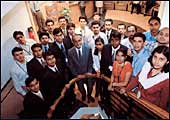 |
| Track
that cash: Bumping up of revenues is one of the most
common crimes |
Less
than a year ago, SembCorp Logistics, a Singapore-based firm, got
a rude shock. It discovered that the top managers at its Indian
subsidiary, SembCorp Logistics (India), had systematically cooked
the books. Revenues had been inflated and expenses misclassified.
The dressing up of balance sheet was first detected when a qualified
accountant from Singapore was sent to India as Deputy Managing Director
in April 2003. And when accountants and lawyers from Deloitte &
Touche and Drew & Napier, respectively, started their investigations,
the true extent of deception at SembCorp Logistics (India) was discovered.
Between 2000 and 2002, profits had been bumped up by Rs 38.80 crore,
and expenses of Rs 7.5 crore had been incorrectly classified as
fixed assets prior to 2002. In a press release put out on July 28
last year, the Singapore-based parent revealed what had happened:
"It was found that certain individuals in the finance department
of (SembCorp Logistics) India had artificially inflated revenue
and expense figures through the creation of fictitious documents,
invoices and journal entries."
While SembCorp Logistics may be the first foreign
firm to have publicly announced mismanagement at its Indian subsidiary,
it is hardly the only such victim. Two years ago, Xerox found that
its Indian accounts had been misreported. The CEO and the CFO of
the company had to pay huge fines and were also banned from practising
accountancy. More recently, in March 2004, there were rumours of
financial irregularities at Adidas India. The company's Managing
Director, Chief Operating Officer, and the Chief Financial Officer
all left. A spokesman of Adidas India, however, denied that anything
had been amiss and that the departure of the top team had anything
to do with the rumours.
Out of Sight...
Fudging of accounts is by no means a new phenomenon,
and subsidiaries of multinationals are no exception. In fact, most
auditors will tell you that this has been going on for years. So
why all the hoopla now? For one thing, post Enron, WorldCom, et
al, and the passing of the Sarbanes Oxley Act in the US that makes
global CEOs and CFOs owners of subsidiary accounts, the penalties
of oversight, intentional or otherwise, can be telling. Says Sunil
Chandiramani, National Director, Risk & Business Solutions Practice,
Ernst & Young India: "Indian subsidiaries of global companies
can be either very large or very small. Until recently, the smaller
ones sometimes flew under the radar because from a significance
perspective, they did not have top management focus. But now, everyone's
started looking at financial matters from a risk management perspective.
So even if the subsidiary is very small, but it is putting the company
to risk, it must be taken care of."
| 6 Steps To Preempt Deception |
» Recruit
the right people; check how they handled failure
» Have a
strong audit committee, with members from overseas parent
» Have regular
internal audits, with audit heads reporting directly to the
board
» Have the
country CFO report to the regional CFO, not the local CEO
» Develop
and drill in a coherent policy of ethics for all employees
» IT systems
such as ERP systems can be used for greater transparency |
But what makes the MNC subsidiaries in particular
easy game? Blame it on a host of factors. One obviously is the physical
distance: more often than not, the headquarters is based several
thousand miles away, making day-to-day monitoring impossible. Another
is inadequate systems of checks and balances. But here's the interesting
bit: Not all managers who end up dressing up their performance do
so to enrich themselves. More often than not, it's simply the pressure
to perform that leads them astray. What seems to have added to the
pressure is the linking of pay to performance, with performance
being defined largely in financial terms. Says R. Sankar, Country
Manager, Mercer hr Consulting: "This system is good, but it
has its downsides. A large percentage (between 40 per cent and 60
per cent) of top management compensation is linked to performance.
Therefore there is an incentive to abuse the system and produce
figures that help their bonuses." Adds Amit Mukherjee, Partner,
Ambit Corporate Finance: "It is a natural instinct. It happens
all over the world, not just in India."
It's probably a convenient excuse, but the
fact remains that trade management in India is not always black
and white. Take transfer pricing. The challenge is to determine
what the fair transfer price is, be it imports or exports. But any
auditor will tell you that the transfer price is often determined
by what suits the management, and not what it ought to be. Then,
there are certain practices that are considered par for the course
in industry. Like booking sales when they haven't been sold, but
are at the dealer's. Says an auditor at one of the Big Three: "For
most FMCGs, the April quarter is a washout. Fudging accounts happens
mostly in the fourth quarter and, in fact, 80 to 90 per cent of
sales happen in the last seven days of every quarter."
 |
''Since performance is
linked to compensation, management has an incentive to abuse
the system''
R. Sankar/Country Manager/Mercer
HR |
Checks and Balances
Is there anything that the absentee parent
can do to prevent managerial shenanigans? Lots (See 6 Steps To Preempt
Deception). Create a system that, if not inviolable, sets off early
alarm bells when rules are not being followed. For instance, if
there is consistent growth quarter after quarter, or stocks seem
to concentrate at a handful of dealers, or sundry debtors are increasing,
then it may be worth investigating. But to create a fairly foolproof
system, a number of things must fall into place. It starts with
people. Do thorough reference checks of top managers you hire. Ask
not just how he or she succeeded in work place, but also how that
person handled failure. Ask if that person is prone to taking short
cuts to achieve targets. Does he bring out the bad news early enough,
or does he wait for it to reach a head before informing his seniors?
Most companies have audit committees, a large
number of which increasingly include members from overseas, thereby
making sure that subsidiary operations are not totally isolated.
Internal audits need to be regularised, on a case by case basis,
and the audit heads must report to the board. Then, CFOs of subsidiaries
could report directly to regional CFOs rather than the local CEO.
Mercer hr, for instance, has a system where the India CFO does not
report to Sankar, but to the CFO in Singapore. Mercer's internal
auditor from New York visits India and interacts with the CFO, clients
and external auditor. Strong it systems, such as ERP systems, can
also be deployed for greater transparency in accounts and reports.
The external auditors must be made to realise
that they are ultimately responsible for the accounts they pass.
In SembLog's case, the services of its auditors (PricewaterhouseCoopers
and KPMG Consulting) were dispensed with after the irregularities
were detected. Says Mukherjee of Ambit: "As far as overstating
or understating accounts is concerned, the responsibility lies squarely
with accounting firms. Andersen went down because of that. It is
their job to see that compliances are followed. If auditors feel
that it is difficult to detect irregularities, then who will detect
it?"
Ultimately, it all depends on the people and
the level of trust permeating through the company. A coherent policy
of ethics has to be drilled in slowly. Introducing effective controls
is the need of the hour, but imposing too many checks can cripple
decision-making, besides imposing very high cost on companies. Because
every other aspect of the business takes a backseat as everyone
focuses on compliance. Notes Sankar: "Let's also admit that
risk is intrinsic to business. If you introduce too many controls,
business will become a bureaucracy." In other words, if you
don't want your managers to cheat, don't give them the means or
the reasons to.
Calling
MBAs
BPOs are no longer infra-dig for hot-shot MBAs.
 |
| New face: vCustomer President Sujit Baksi
(centre) with MBA recruits |
The
outsourcing boom is here to stay. And wagering their careers on
it are MBAs from India's top B-schools. IIM Kolkata's Priya Ramanathan,
for example, said no to three job offers on campus and settled for
one from the Delhi-based vCustomer. Today, she is a Manager (of
quality) at the 3,500-seater BPO firm. Ditto, Sohit Brahmawar, an
MBA from the Hyderabad-based Indian School of Business, who declined
offers in favour of vCustomer, where he's the director of operations.
Finally, an industry that for long had to make do with graduates,
is getting its fair share of young talent. At ISB, for example,
vCustomer received 107 applications. In IIM Kolkata, it got 137.
Then, there are other BPO outfits recruiting MBAs off campuses.
EXL and ICICI OneSource made offers at IIM Lucknow and Bangalore,
XLRI, SP Jain, FMs (Delhi) and Sybmiosis Institute, among others.
EXL snagged five, and ICICI OneSource, 11. Says Brahmawar: "BPOs
were the flavour of the season this year. After all, it has put
India on the global map."
On their part, the BPOs are happy to get top
talent. As they grow, they find that there are only so many graduate
employees who make the cut for top management, which must handle
crucial functions of operations, hr, business development, and process
excellence (besides finance). Says Deepak Dhawan, Head of hr at
EXL Service: "They bring in a professional background and management
flexibility unlike the internally recruited managers who are groomed
in specific domains." Adds Sujit Baksi, President, vCustomer:
"The recruitment reflects management's long-term investment
in the next generation of senior leadership." The entry of
MBAs should also help the industry shed its image of a low-brow
sweat shop.
-Supriya Shrinate
Flippin'
At McDonald's
Modern School students get a taste of the real
McDonald's.
 |
| Serving it up: Students at McDonald's |
Teenagers
are to Mcdonald's what potato is to fries. But school kids flipping
(not munching) burgers at the golden arches? It happened in mid-May
when 50 students from Delhi's Modern School landed up at 10 McDonald's
outlets in Delhi as part of a personality development programme
(PDP), a brainchild of the school's principal, Lata Vaidyanathan.
For 15 days they helped make burgers, man checkout counters, supervise
restaurant floors, and even handle irate customers. Says Suraj Pratap
Malik, a grade 11 student: "I learnt the value of hard work and
money." What's in it for McDonald's? "Apart from contributing to
society, it makes for better customers who swear by our system,"
explains Vikram Bakshi, Managing Director, McDonald's India. But
then McDonald's and children go back a long way. Founder Ray Kroc
built his fortune feeding children of post-war America's baby-boomers.
Buoyed by the experience, McDonald's now wants to take the programme
to other parts of the country.
-Supriya Shrinate
|
